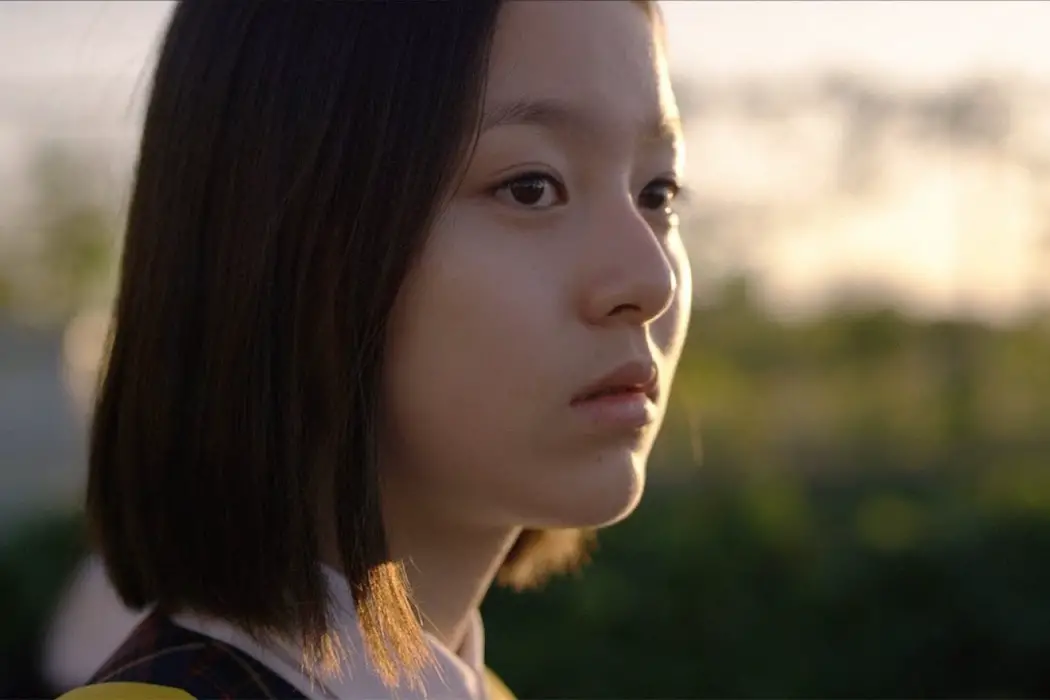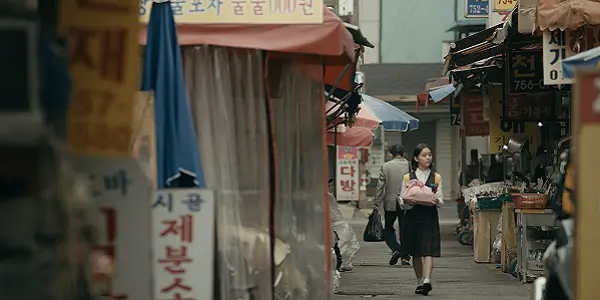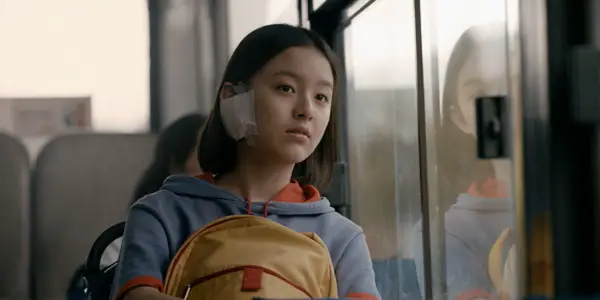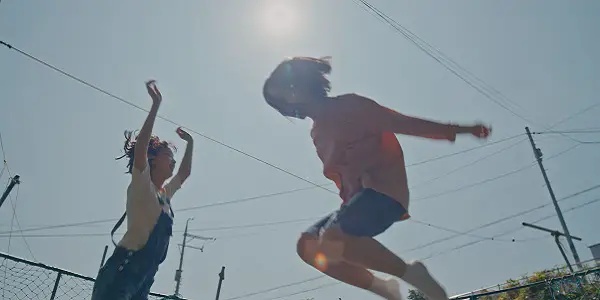HOUSE OF HUMMINGBIRD: The Girlhood Gaze

Lee Jutton has directed short films starring a killer toaster,…
The feature debut of South Korean filmmaker Kim Bora, House of Hummingbird is a coming-of-age film set against the backdrop of Seoul in 1994, a time of rapid modernization in South Korea. Inspired by Kim’s personal experiences growing up in Seoul at that pivotal time, the film follows teenager Eun-hee as she struggles to deal with a difficult family, a health scare, and romantic entanglements with boys and girls alike.
Having earned deserved acclaim around the world, including major prizes at the Tribeca, Berlin, and Busan film festivals, House of Hummingbird is a beautiful yet bleak slice of one girl’s life during a moment of striking upheaval, and a much-needed reminder that when one pushes through the darkness, one will eventually find the light.
Youth in Revolt
Eun-hee (Park Ji-hu) is an awkward teenage girl who struggles to pay attention in school; she prefers to draw, with the ultimate goal of becoming a cartoonist. When her eccentric homeroom teacher asks her classmates to nominate the student most likely to become a delinquent, Eun-hee wins by a landslide. Undeterred, her strict parents (Jung In-gi and Lee Seung-yeon), who run a rice cake shop, enroll her in a Chinese cram school to help her prepare for further entrance examinations.

Masters in the art of tough love, Eun-hee’s parents obsess over their three children’s prospects of getting into quality universities, seeing schooling as the only chance their children have to achieve better things than their parents. Indeed, they’re so focused on the promising prospects of elder son Dae-hoon that they ignore the fact that he brutally beats Eun-hee. Elder sister Soo-hee, on the other hand, prefers to skip school and hang out with boys, much to her parents’ chagrin. It doesn’t help that mother and father get into screaming fights at home that occasionally veer into violence, making it clear why their two daughters prefer to spend as much time away from home as possible.
When not at school, Eun-hee jokes around with best friend Ji-sook and juggles her relationship with her boyfriend with a potential romance with a female classmate who professes to have a crush on Eun-hee. When she finds a strange lump under her ear, she’s sent to a hospital to have it removed, aware that if the surgery goes wrong half of her face could be paralyzed. All in all, it’s a lot for a young girl to deal with, and the only person who seems to understand what Eun-hee is going through is her new Chinese cram school teacher, Young-ji (Kim Sae-byuk), an empathetic young woman who comforts Eun-hee in the face of betrayals and beatings.

Pain and Glory
House of Hummingbird is a film grounded in a very specific place and time, aided by the soft glow of Kang Guk-hyun’s cinematography and the subtle synthesizers of Matija Strniša’s electronic score. Key events of the time period play a role in the story, including the death of North Korea’s Kim Il-sung and the collapse of Seoul’s Bridge. The rapid economic growth of that time is represented in the banners and graffiti that pop up on walls throughout Eun-hee’s neighborhood, angrily decrying the gentrification of the area. Yet even if you are unfamiliar with South Korea during this time period, Eun-hee’s journey of self-discovery is one that is timeless.
There is a beautiful moment in House of Hummingbird in which Eun-hee, alone at home, puts on a lilting Korean pop song to dance around the house. Yet her dancing is in sharp contrast with the lightness of the music; her body lurches around the room in loud, angry stomps and kicks before she dissolves in sobs. Shot in one take from across the room, with a kitchen counter providing a barrier between the audience and our distressed protagonist, it’s a perfect, poignant rendering of teenage isolation and frustration. Kim Bora’s naturalistic direction focuses more on finding the emotion in her lead actor’s face and body than it does on attempting to elicit emotion from tried-and-true cinematic devices, and the result feels incredibly intimate.

That lead actor, Park Ji-hu, is remarkable as Eun-hee, a teenage girl whose behavior occasionally veers into selfishness and stupidity yet still remains sympathetic throughout. It’s worth noting that in casting an actual teenage girl, instead of someone in their early twenties, as filmmakers so often do, Kim Bora makes it much easier for us to understand and empathize with Eun-hee in her moments of youthful impetuousness. Eun-hee’s relationship with best friend Ji-sook also oozes painful authenticity in its emotional ups and downs, including a fight over a shoplifting incident and Ji-sook telling Eun-hee in a moment of frustration, “You only think about yourself.”
Throughout House of Hummingbird, Eun-hee appears to just be looking for someone to lean on, someone to give her the much-needed emotional support that her family seems incapable of providing. She lands on Young-ji, the cigarette-smoking university student who teaches Eun-hee just as much about the strength needed to cross the border from childhood into adulthood as she does about Chinese. Yet Young-ji has her own hidden depths that Eun-hee cannot fully understand, having not crossed that border yet herself. “It takes some time to learn to like yourself,” Young-ji tells Eun-hee, all while admitting that there are still many moments in which she does not like herself at all. Later, Eun-hee writes a letter to Young-ji and asks, “When will my life begin to shine?” While no answer is forthcoming, one can see the light glimmering on the horizon, and that’s enough to feel hopeful.
Conclusion
With a running time of two hours and eighteen minutes and a story loaded with heavy topics, House of Hummingbird isn’t the easiest of films to watch, but it is definitely one of the most rewarding. I look forward to seeing more from Kim Bora, a filmmaker who clearly knows that sometimes the lightest touch can have the greatest impact.
What do you think? What is your favorite coming-of-age film? Share your thoughts in the comments below.
House of Hummingbird is available for streaming via Kino Lorber’s Kino Marquee initiative as of June 26, 2020.
Watch House of Hummingbird
Does content like this matter to you?
Become a Member and support film journalism. Unlock access to all of Film Inquiry`s great articles. Join a community of like-minded readers who are passionate about cinema - get access to our private members Network, give back to independent filmmakers, and more.
Lee Jutton has directed short films starring a killer toaster, a killer Christmas tree, and a not-killer leopard. Her writing has appeared in publications such as Film School Rejects, Bitch: A Feminist Response to Pop Culture, Bitch Flicks, TV Fanatic, and Just Press Play. When not watching, making, or writing about films, she can usually be found on Twitter obsessing over soccer, BTS, and her cat.













